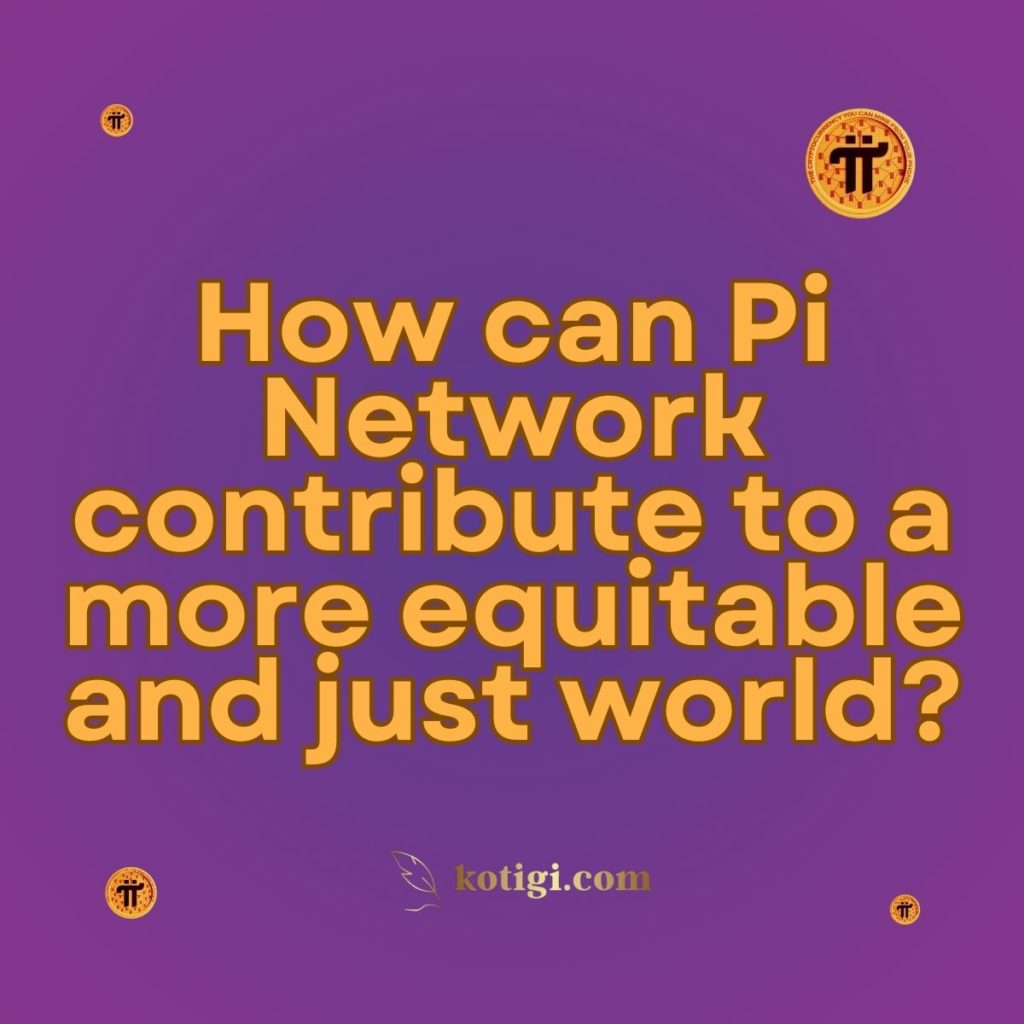
How can Pi Network contribute to a more equitable and just world?
Pi Network, with its vision of creating a decentralized, inclusive digital currency, has the potential to contribute to a more equitable and just world. By leveraging the power of blockchain technology, fostering financial inclusion, and building a community-driven ecosystem, Pi Network can address some of the pressing issues related to economic inequality and social justice. Here’s how Pi Network can make a meaningful impact:
1. Promoting Financial Inclusion
1.1. Access to Financial Services for the Unbanked:
One of the most significant ways Pi Network can contribute to a more equitable world is by providing access to financial services for the unbanked and underbanked populations. In many parts of the world, traditional banking services are either inaccessible or too expensive for a large portion of the population. Pi Network’s mobile-first approach allows individuals to participate in the global economy without needing a traditional bank account. This can empower people in developing countries to save, invest, and transact more effectively, contributing to economic growth and stability in their communities.
1.2. Lowering Barriers to Entry:
Traditional financial systems often have high entry barriers, such as strict identification requirements, minimum balances, and transaction fees. Pi Network lowers these barriers by allowing anyone with a smartphone to mine and use Pi coins without any upfront costs or specialized knowledge. This democratization of access to digital currency can help level the playing field, enabling more people to participate in economic activities.
2. Empowering Local Economies
2.1. Supporting Small Businesses:
Pi Network can play a crucial role in empowering small businesses, especially in regions where access to capital and financial infrastructure is limited. By providing an alternative payment system that is fast, secure, and decentralized, Pi Network can help small businesses reduce transaction costs, avoid currency fluctuations, and reach a global customer base. This can lead to job creation, increased income, and overall economic development in underserved areas.
2.2. Encouraging Peer-to-Peer Transactions:
The peer-to-peer nature of Pi Network allows users to transact directly with one another without intermediaries, such as banks or payment processors. This can reduce transaction fees and increase the efficiency of local economies. Additionally, by facilitating local trade and commerce, Pi Network can help build stronger, more resilient communities that are less dependent on centralized institutions.
3. Reducing Economic Inequality
3.1. Democratizing Wealth Creation:
Pi Network offers a unique opportunity for wealth creation that is not confined to traditional financial hubs or those with significant capital. By allowing users to mine Pi coins using their smartphones, Pi Network democratizes the process of earning cryptocurrency. This can help reduce economic inequality by providing individuals from all backgrounds with the opportunity to participate in and benefit from the growing digital economy.
3.2. Fair Distribution of Resources:
Unlike traditional financial systems that often concentrate wealth in the hands of a few, Pi Network’s decentralized model aims to distribute value more equitably among its users. The network’s reward system encourages users to contribute to the ecosystem, whether by securing the network, participating in governance, or promoting adoption. This community-driven approach ensures that the benefits of the network are shared more fairly among its members.
4. Fostering Social Justice
4.1. Empowering Marginalized Communities:
Pi Network can empower marginalized communities by providing them with the tools to participate in the global economy on equal footing. By offering a decentralized financial platform that is not controlled by any single entity, Pi Network can give individuals more control over their financial lives. This can be particularly impactful in regions where economic opportunities are limited due to discrimination, corruption, or other forms of social injustice.
4.2. Promoting Transparency and Accountability:
Blockchain technology, which underpins Pi Network, is inherently transparent and immutable. This can promote greater accountability in financial transactions, reducing the potential for corruption and fraud. By ensuring that all transactions are recorded on a public ledger, Pi Network can help build trust and integrity in economic systems, which is essential for social justice.
5. Building a Global, Inclusive Community
5.1. Encouraging Global Participation:
Pi Network’s vision of creating a global community of users who are united by a common purpose can contribute to a more inclusive world. By bringing together people from different cultures, backgrounds, and socioeconomic statuses, Pi Network can foster greater understanding and collaboration across borders. This global network of users can work together to address common challenges and promote a more just and equitable world.
5.2. Inclusive Governance:
As Pi Network evolves, its governance model could be designed to include all members of the community in decision-making processes. By giving every user a voice in how the network is run, Pi Network can ensure that its policies and practices reflect the diverse needs and perspectives of its global user base. This inclusive approach to governance can help prevent the concentration of power and promote a more just and democratic system.
6. Promoting Sustainable Development
6.1. Supporting Environmental Sustainability:
Pi Network’s consensus algorithm is designed to be energy-efficient, which contrasts with the energy-intensive mining processes of some traditional cryptocurrencies like Bitcoin. By minimizing its environmental impact, Pi Network aligns with the principles of sustainable development, which are essential for creating a more just world. Additionally, Pi Network could support projects and initiatives that promote environmental sustainability, further contributing to global efforts to combat climate change and preserve natural resources.
6.2. Encouraging Responsible Innovation:
As a relatively new player in the cryptocurrency space, Pi Network has the opportunity to set a standard for responsible innovation. By prioritizing ethical practices, transparency, and community engagement, Pi Network can contribute to the development of a more sustainable and equitable digital economy. This commitment to responsible innovation can help ensure that the benefits of Pi Network are shared widely and fairly, without exacerbating existing inequalities or creating new forms of exploitation.
Conclusion
Pi Network has the potential to contribute to a more equitable and just world by promoting financial inclusion, empowering local economies, reducing economic inequality, fostering social justice, building a global and inclusive community, and promoting sustainable development. By leveraging the power of decentralized technology and prioritizing the needs of its diverse user base, Pi Network can help create a more fair and inclusive global economy. As the network continues to grow and evolve, it has the opportunity to make a lasting impact on the lives of millions of people worldwide, advancing the cause of equity and justice in the digital age.





